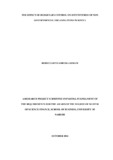| dc.description.abstract | Budgeting involves the establishment of predetermined goals, the reporting of actual
performance results and evaluation of performance in terms of the predetermined
goals. Budgetary control systems are universal and have been considered an essential
tool for financial planning. The purpose of budgetary control is to provide a forecast
of revenues and expenditures this is achieved through constructing a model of how
our business might perform financially speaking if certain strategies, events and plans
are carried out. Most firms use budget control as the primary means of corporate
internal controls, it provides a comprehensive management platform for efficient and
effective allocation of resources. Budgetary controls enable the management team to
make plans for the future through implementing those plans and monitoring activities
to see whether they conform to the plan, effective implementation of budgetary
control is an important guarantee for the effective implementation of budget in the
organization. This study examined the budgetary control in Non-Governmental
Organizations and its effects on their performance. The research target population
consisted of 7,127 Non-Governmental Organizations. Thirty Non-Governmental
Organizations were selected using convenience judgmental sampling technique, both
local and international organizations with headquarters in Nairobi. A descriptive
survey (questionnaires) was used in the data collection. The statistical package for
social sciences version 17.0 was used to analyze the data using descriptive statistics,
including means and standard deviation. The relationship between budgetary controls
and performance of the NGOs was analyzed using correlation and regression analysis.
The research findings established that there is a weak positive effect of budgetary
control on performance of Non-Governmental Organizations in Kenya measured by R
square at 14.3%. The research recommends that employees need to be sensitized on
budgetary controls and the effect on performance of the organization. It also
recommends that other factors that influence performance apart from budgetary
controls should be investigated by organizations. It also suggests that further research
should be done on the same area but a larger sample should be used. | en_US |

